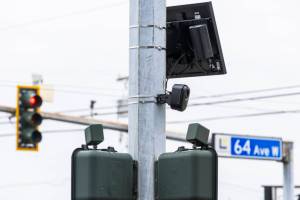Trump talks to, answers questions from the NY Times
Published 1:30 am Tuesday, November 22, 2016
By Jerry Markon, Paul Farhi and Karen Tumulty
The Washington Post
President-elect Donald Trump canceled a meeting at the New York Times on Tuesday and blasted the publication on Twitter hours before reversing himself and agreeing to an extensive interview during a lunchtime meeting.
Meeting at the newspaper’s midtown Manhattan headquarters, Trump spoke frankly about a number of topics with the paper’s editors, reporters and business executives.
Trump said he didn’t intend to prosecute his Democratic opponent, Hillary Clinton, over her use of a private email server while she was secretary of state, countering his campaign rhetoric.
“It’s just not something that I feel very strongly about,” he said, according to Times journalists who livetweeted the hour-long session. “I don’t want to hurt the Clintons, I really don’t. She went through a lot and suffered greatly in many different ways.”
He also acknowledged that there is “some connectivity” between climate change and human activity, a softening of his campaign stance. But he said he is also thinking about “how much it will cost our companies” and how it will affect American competitiveness.
Asked about a meeting of white supremacists in Washington over the weekend, Trump said “of course … I disavow and condemn them.”
Trump left the meeting around 2 p.m., amid jeers and a few boos from a crowd of passersby assembled in the newspaper’s lobby.
Trump had scheduled two meetings with the publisher and journalists from the Times on Tuesday, including one on-the-record session. But the president-elect, who frequently attacked the paper during his campaign, suddenly canceled the events in a series of tweets.
“I cancelled today’s meeting with the failing nytimes when the terms and conditions of the meeting were changed at the last moment. Not nice,” Trump wrote to his nearly 16 million followers on the micro-blogging site. “Perhaps a new meeting will be set up with the nytimes,” he continued. “In the meantime they continue to cover me inaccurately and with a nasty tone!”
Times editors and reporters also took to Twitter to deny Trump’s account. Clifford Levy, the paper’s assistant masthead editor, tweeted out an official response saying it was the president-elect who had tried to change the ground rules by seeking only a private meeting. “We did not change the ground rules at all and made no attempt to,” Levy wrote. “We were unaware that the meeting was cancelled until we saw the President Elect’s tweet this morning.”
Times columnist Nicholas Kristof went further, tweeting: “Mr. President-Elect, no reason to be scared of Times journalists!”
However, by mid-morning, word came down from Trump Tower that the meeting was back on. The Times also released a statement saying: “Mr. Trump’s staff has told us that the President Elect’s meeting with The Times is on again. He will meet with our publisher off-the-record and that session will be followed by an on-the-record meeting with our journalists and editorial columnists.”
The extraordinary spectacle of a man about to become president and one of its leading newspapers engaging in a Twitter war underscores how Trump’s always contentious relations with the media have deteriorated even further since his election. The relationship between presidents and those who cover them is often an adversarial one, but media experts say Trump’s blasts against reporters — he called them the “lowest form of humanity” during the campaign — have broken new ground.
His Twitter spat with the Times came one day after Trump did sit down with television news executives and some well-known TV journalists – and repeatedly told them the campaign reporting about him was “unfair” and “dishonest.”
Participants in the meeting at Trump Tower in New York described it as a contentious but generally respectful gathering.
But if the media elite attended in hopes of improving relations with the forthcoming Trump administration, that wasn’t quite in the cards. The president-elect specifically called out reporting by CNN and NBC that he deemed unfair, according to four people who attended the meeting, all of whom spoke on the condition of anonymity because the meeting was off the record.
Instead of striking a harmonious tone to build rapport following the election, Trump was combative, participants said. In a calm and deliberate voice, he told the group sitting around a conference table that they had failed to provide their viewers with fair and accurate coverage, and told them they failed to understand him or his appeal to millions of Americans.
But he made no mention of the enormous amount of airtime that the networks, especially on cable, devoted to his campaign. A number of analyses have noted that Trump’s presidential effort was boosted by the news media’s fascination with him.
In a sign of another battle with the media to come, Trump also shrugged off the need for a constant press pool covering him, the people said, though he did not delve into specifics. Trump has repeatedly shirked his pool, upending a long-standing tradition of the president and president-elect.
A protective pool, as it is known, is considered necessary for disclosure of what the president is doing and transparency when big news breaks. Democratic nominee Hillary Clinton, for example, drew criticism when she left a September 11 memorial ceremony after falling ill without alerting pool reporters.




